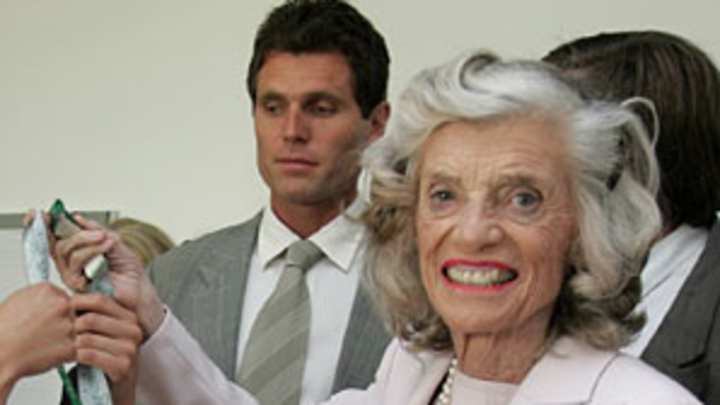My Sportsman: Eunice Kennedy Shriver


Sports Illustrated will announce its choice for Sportsman of the Year on Nov. 30. Here's one of the nominations for that honor by an SI writer.
I had steeled myself for sadness before attending my first Special Olympics local event in Tampa, Fla., during the early '90s. I thought it would be tough to watch athletes with Down syndrome, autism and other intellectual disabilities race and jump and throw in competition. I had it all wrong.
I can remember a competitor named Cindy, who tore down the track with all her might and then broke into a full-on giggle as she crossed the finish line, second out of six, to medal. And doesn't that kind of response define sports? Effort matched with the joy of achievement? Cindy was like any athlete, anywhere. And this is what Eunice Kennedy Shriver accomplished as the founder of the Special Olympics movement during a robust life of advocacy that ended with her death in August at age 88. Using sports to create worldwide change, Shriver parlayed her privilege and pedigree as a Kennedy into bringing the misunderstood and marginalized into the mainstream.
She will be missed but will forever remain as the barrier breaker whose 40-year campaign put the spotlight on millions of athletes across 180 countries. Without her relentless lobbying, it is very possible that those with mental challenges would still be hidden from view, institutionalized instead of embraced. Without her access to the halls of political power, those children who lived life being called "retards" by the misinformed and unfeeling wouldn't have had a voice.
Shriver didn't pick this cause as much as the cause picked her. Inspired by her mentally disabled sister Rosemary, Shriver began with a grassroots Special Olympics in Chicago in 1968, featuring 1,000 athletes from 26 states and Canada. As she said at the opening of the 1987 games, which more than 5,000 athletes attended, "You are the stars and the world is watching you. By your presence, you send a message to every village, every city, every nation. A message of hope. A message of victory."
There are a few celebrities and influential power brokers -- and, let's face it, some athletes -- who take on charity work for what it does for them and their image. I have been to Habitat for Humanity projects where star players arrive on the work site for the cameras, hammer a nail and leave. Shriver pushed her philosophy and philanthropy with work gloves on. She could be seen assembling medal platforms, lifting banners and moving high-jump bars into place. She could be heard working donors for support and shouting encouragement to sprinters at the games.
"She never gave less, never lowered her standards or lowered her ideals," Susan Saint James, an actress and long-time Special Olympics volunteer, told The New York Times. "She lived like that and expected you to. Once, we were in Jamaica and we were out in some sports facility that was sort of frightening. But she was out there making Spam sandwiches and handing out the medals. She was a full-service volunteer. She did very few things in a ball gown.''
There was no pretense to Eunice Kennedy Shriver, the fifth of nine children of Joseph and Rose Kennedy. She had a vision unclouded by what others believed, by how society stereotyped the mentally disabled, by the conventional norm of sports. She was all effort in altering the view, a sporting woman sustained by the joy of winning against misperception -- just like the athletes she championed.
